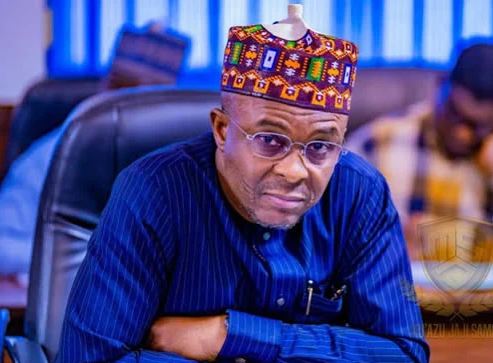At a recent sensitization forum, experts stress that the National Single Window policy when implemented, will Boost Nigeria’s admission into the International Maritime Organisation’s (IMO) Category ‘C’ while they call for its speedy implementation
Following the introduction of a national single window in Nigeria’s maritime sector, expectations are high that the initiative will facilitate the country’s admittance into Category ‘C’ of the International Maritime Organisation just as stakeholders, particularly the Nigeria Customs Service, seek its immediate implementation to boost trade between Nigeria and its partners globally.
Managing Director of the Nigeria Port Authority (NPA), Dr. Abubakar Dantsoho, has said the implementation of a national single window (NSW) will promote Nigeria’s standing in the Committee of Maritime Nations and provide the reputational capital necessary for actualizing the admittance of Nigeria into the Category ‘C’ of the International Maritime Organization (IMO).
Dantsoho, who spoke at the opening of the ongoing stakeholder’s conference on the NSW in Lagos, stressed the impact of single window and trade facilitation through most single-line processes at the nation’s ports.
Highlighting the importance of the NSW and the efforts the authority has made to create an enabling environment for its speedy implementation, Dantsoho said the NPA views the project as one of the most strategic port development initiatives in over two decades since the port reforms of 2003.
“Now, the reason is the single window operations relate to over 500 million container movements in the world and over 50 billion tons of cargo through the sea, the land and the airports.
“This concrete move by President Ahmed Bola Tinubu to implement the National Single Window in Nigeria will by far help to deepen the competitiveness of our ports and position the good people of Nigeria to the greater benefits of global trade. In our own special way, the Nigerian Port Authority has been pursuing the idea of the port community system which is a forerunner to the single window nationally.
“The purpose of the port community system is primarily for Nigeria to comply with the dictates of the International Maritime Organization, Convention on Facilitation of International Maritime Traffic, whose main aim or objectives are to prevent unnecessary delays in maritime traffic, to aid cooperation between governments, and to secure the highest practicable degree of uniformity in formalities and other procedures on the port,” he noted.
Similarly, he affirmed that the World Trade Organization’s (WTO) trade facilitation agreement requires member states to implement the single window system, adding that it should be observed that the World Trade Organization’s (WHO) agreement is now in force and therefore, the establishment of this National Single Window is mandatory for Nigeria.
“In recognition of the importance of this noble objective, the NPA had enlisted the technical guidance of the IMO ahead of time for the deployment of the port community system, PCS, which, as I said earlier, is a precursor to the National Single Window and only recently upon our fulfillment of the necessary requirements, Nigeria was admitted as a member of the International Port Community System Association to join top-class ports in the region like Tangier Med Port of Morocco, the Port of Teman in Ghana, the Togo Port, Ivory Coast and the Republic of Benin, among others,” he stated.
He said the NPA noted the importance of the single window and has planned and implemented its own strategy and provided leadership within the Nigerian port community.
“Clearly, the Authority has taken a very proactive approach to embracing ICT technologies and implementing a number of its own internal activities, in the belief that the cargo operations in our ports cannot meet international best practices without the port community system.
“Clearly, the National Single Window is a central piece in the modernization of our trade facilitation, and the Nigerian Port Authority, under the visionary leadership and supervision of the Minister of Marine and Blue Economy, is fully committed to a successful implementation of this programme.
“At a time like this, a phase in which Nigeria is undergoing a socio-economic turnaround, the Nigerian Port Authority will certainly strive to match the pace and expectation of the government under President Tinubu’s Renewed Hope Agenda.
“It is important to state at this juncture that the final government implementation of the sales of crude oil to local refiners and refined petroleum products in Naira for domestic consumption, which was effective from October 1, 2024 as approved by the President, is today a success story.”
Dantsoho further pointed out that the OAS has ensured that the relevant agencies carried out their tasks without delay and without any chance of any corrupt practices, maintaining that the process is ongoing and is getting better.
It is important to note that other African countries, especially the three largest ports in Africa, in terms of size and capacity, recorded major successes because of their early adoption of both the port community system and the national single window.
Meanwhile, after over a decade of failed attempts to implement the international trade Single Window in Nigeria, Comptroller-General General of the Nigeria Customs Service (NCS), Bashir Adewale Adeniyi has identified hydra-headed factors that have undermined every effort on the project and proffered ways to make it work.
According to the World Customs Organisation (WCO), a Single Window (SW) is a trade facilitation concept that enables traders and businesses to submit standardised information and documents through a single entry point to fulfil all regulatory requirements related to import, export and transit. It simplifies and streamlines interactions with government authorities, thereby improving efficiency and reducing costs and delays in cross-border trade.
Since 2014, Nigeria has made efforts twice to create and implement the Single Window without success.
Speaking at a stakeholders forum on the National Single Window implementation in Lagos, Adeniyi asserted that for the National Single Window to work in Nigeria, all relevant agencies in the country’s trade and revenue system “must embrace a singular purpose backed by an unwavering government support, ensuring that the single window is not perceived as sole mandate, but as a national strategy supported by all stakeholders, including the private sector, financial institutions, and regulatory agencies.”
Continuing, he said: “The centrality of customs in this ecosystem is undeniable, but success requires a symbiotic relationship where each stakeholder plays its path with precision and commitment and technology has often been cited as the cornerstone of the single window system but technology alone is not the solution.
“The deployment of advanced digital platforms must be accompanied by meticulous process reengineering, capacity building, and proper change management. Past efforts in Nigeria have failed due to over-emphasis on technology without adequately addressing the human and operational dimensions. A successful single window system must reflect the peculiarities of Nigeria’s trade environment, incorporating user friendly designs, interoperability with existing systems and scalability to accommodate future growth.”
Adeniyi, who was represented at the event by the Head of Customs Information and Communications Technology (ICT), Deputy Comptroller-General (DCG), Kikelomo Adeola, pointed out that all attempts to build the National Single Window in the past failed due to challenges ranging from fragmented technological systems and institutional bottlenecks to misaligned stakeholder expectation and inadequate physical and technological infrastructure.
“While these obstacles have slowed our progress, they have also provided invaluable lessons that shaped the roadmap for future sources. A critical reflection on past attempts reveals the necessity of a unified vision driven by strong political will and institutional committee, fragmentation in leadership and inconsistent policy direction, which undermined the effectiveness of earlier initiatives,” she noted.
The Customs helmsman stressed that continuous stakeholder engagement must be at the heart of the implementation process, adding that previous initiatives suffered from limited collaboration and inadequate communication, which bridge the trust gap and soften resistance among stakeholders.




